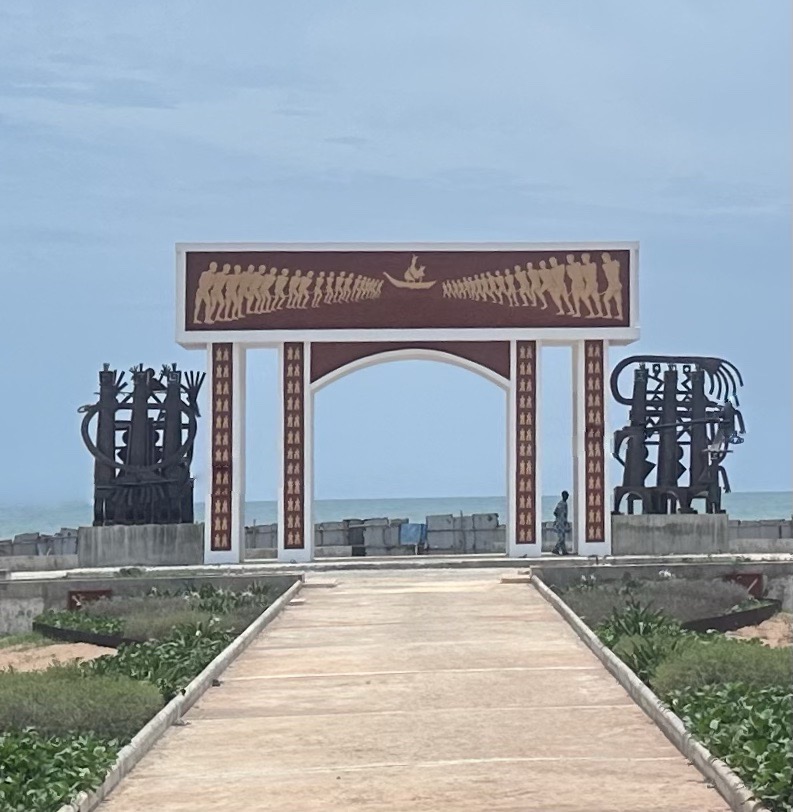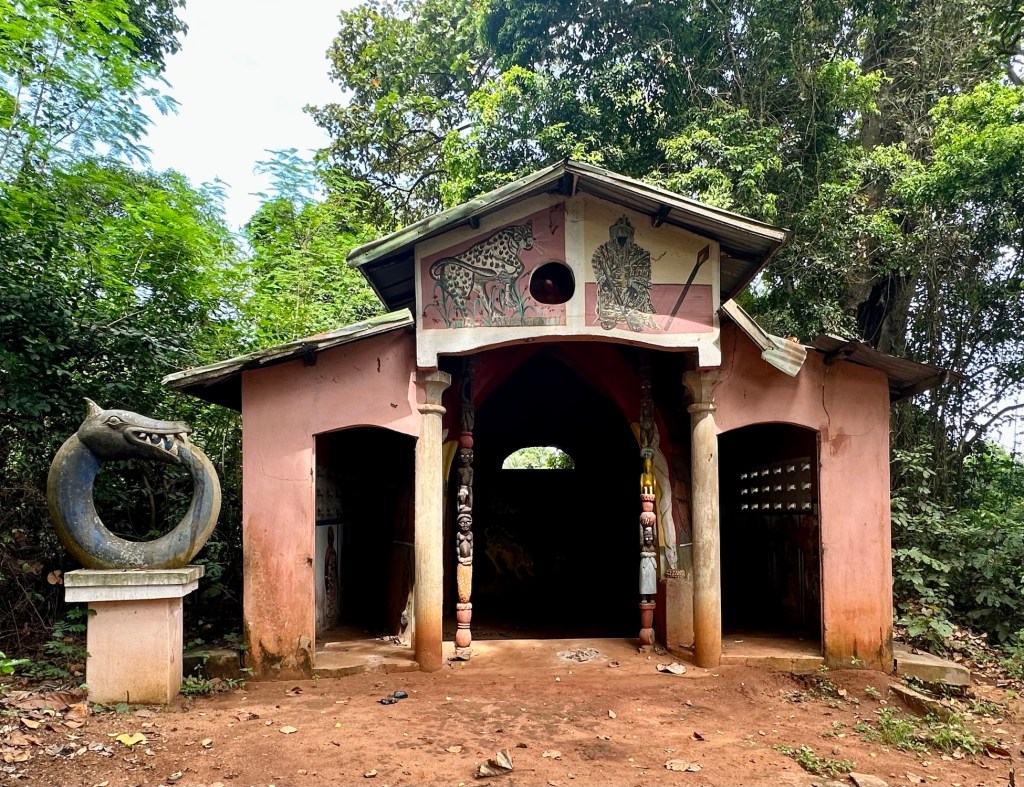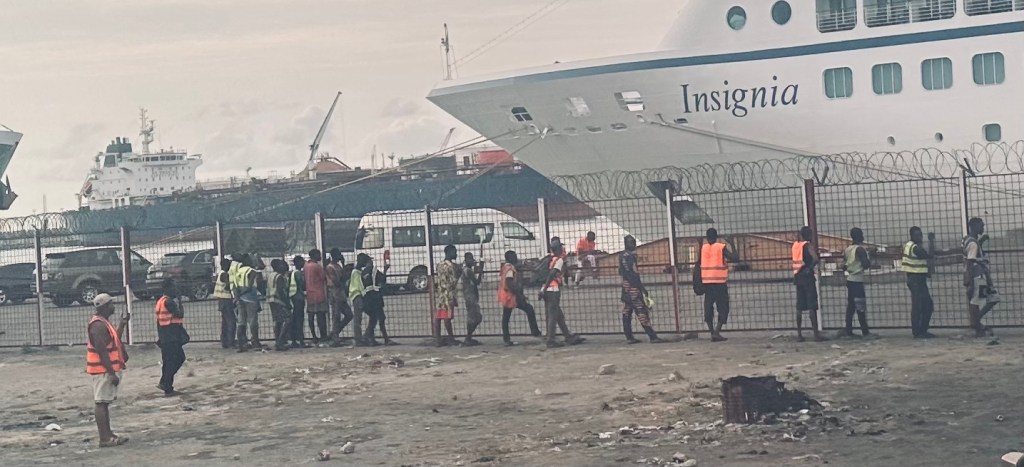Day 73 – Cruising the Gulf of Guinea – Find Insignia (still under armed guard) on CruiseMapper
We start this Partout with a bold prediction/hot tip for seekers of off-the-beaten path travel: Within 5 years, Benin will start showing up in those “off-the-beaten-path” lists of don’t-miss destinations.
A heads-up to our travel trend-setting friends and followers: This one’s for you.

The Background
Benin is home to 12 million people from 42 ethnic groups. Within its borders lie the lands of the once-powerful Kingdom of Dahomey, which endured for nearly 300 years until the British invaded, burned its capital city to the ground and grafted the kingdom onto colonial British Nigeria. France and Britain later divvied up the territory between them, and Benin ended up on the French side of the trade. French remains the official language today.
More than a century after these transactions, Dahomey’s legendary artistry and Amazonian warriors have been triumphantly reunited in “Amazone,” a breathtaking 100-foot statue of a woman warrior. Unveiled in 2022 in the capital city of Cotonou, the monument pays tribute to female bravery and celebrates women in general.
Any country that would erect a 100-foot-tall salute to women is already in a class all its own as far as Doris is concerned. Bonus points for bringing field trips of schoolchildren to pose for pictures at her feet.

The towering image is situated in a vast open esplanade, and it felt like the perfect image for what Doris and Louis saw in Benin. The country has committed $1 billion USD to restoring and showcasing its history and culture. None of the other seven West African countries we visited remotely approach Benin’s active campaign to take a place on the world stage.
We could see the nation’s vision in the Cotonou boulevards being paved and edged with decorative sidewalks and lush landscaping and on the beaches planted with nascent palm orchards.

Aspiration was evident in the government-funded wall of street art that stretches half a mile along the beachfront and in the luxury waterfront hotel complex under construction nearby. The Embassy Row filled with eye-popping architecture suggests that other nations are taking note already.

Last year, France repatriated 26 of the famed Dahomey Bronzes stolen by Britain during its sack of the kingdom. The Beninois government invited its population to view the ancestral art at a free exhibition in the presidential palace in Cotonou. Two hundred thousand people showed up. Now three new art museums are under construction.
The History
Impressive as any or all this may be, it is rising on a foundation of history and culture that already gave Benin a compelling story to share.
In 1996, UNESCO recognized the city of Ouidah on the outskirts of Cotonou for its role as a West African slave route. More than one million kidnapped Africans were shipped to the Americas from Ouidah between 1721 and the early 1800s. Symbolic artworks like “The Door of No Return” now stand along the last four kilometers of the route to recognize landmark locations and historic significance.

At the same time, the fort where captured men, women and children were held before shipping is being restored. A life-size replica of an 18th-century slave ship is under construction (reportedly with Chinese financing). A sparkling Ouidah history museum just opened; our Insignia excursion became its first visitors, filmed by a local camera crew.

Everything in the architecture has a meaning derived from an even older element of Benin culture: Voodou, illustrated by the shrine below and the representation of a python swallowing its tail, symbolic of the continuity of life.

“Not Black Magic”
Along with Nigeria and Ghana, Benin is the birthplace of Voodou (or Voodun), the traditional religion of the region. By some estimates, half the people in Benin practice Voodou, often intermingled with Christianity or Islam.
On our day in Ouidah, we met Voodou initiates, wandered a forest sacred to Voodou believers and visited a Voodou python temple. We saw statues of Voodou deities and wrapped a python around our necks.

In African Voodou, we were told, the use of the religion’s powers to direct bad outcomes is forbidden. “Voodou is not black magic,” our guide Marie-Paula said. “It’s not TV.” When the powers are misused, the potent god of thunder (below) punishes the misusers.

The Americas are something of a special case when it comes to using Voodou, the guide said. There, Voodou there became a defense against enslavers.
“In Voodou, we have a lot of power,” said Marie-Paula. “It is intended only for positive results, not for cursing one another. But people in Haiti were enslaved and suffering, and the power became used for bad things because of this.”
Marie-Paula explained that Voodou sees life as physical and spiritual, visible and invisible utilizing a system of divination to answer questions.
The Future for Bucket-List Benin
Alas, Partout has no powers of divination.
The combination of art, architecture, history, religion, monuments and all the rest may not, in the end, overcome Benin’s poverty, once or future despotic leaders, corrupt foreign investors, offshore piracy, and other curses on life and tourism. Some elements of the infrastructure, such as public restrooms, are not ready for show time. In the sacred forest, women visitors queued for very basic toilets in small sheds while men were directed to relieve themselves under the trees.
We heard after our visit that Insignia was the first cruise ship to visit Benin for five years. That probably explained the line of locals gripping the chain-link fence in the port to stare as we disembarked for the day. The boldness of Benin’s bet on its future seemed even bolder from that viewpoint.

Regardless. If we were betting people, we would bet on Benin’s future as a destination for the inquisitive, the adventurous and, yes, the trend-setters.
When that happens, remember: You heard it here first.
Another Question Answered
Gwenn asked, “Are you wondering whether you will EVER be able to get back to a ‘regular life’?”
In all candor … no and yes.
The “no, we don’t wonder” is because we know we will be happy to get back to friends, home, routines, INTERNET. We do not count ourselves (yet?) among the many happy cruisers aboard who cruise for the fun of cruising. We are relishing every day of our circumnavigation because we are tickled pink to be seeing parts of the world we would otherwise never see (Benin!). For us, the unique itinerary is the draw and, unless we come across another one, we will happily revert to our usual MO of land travel, which suits us.
The ”yes” part is that, yes, it is a little hard to imagine right now – living in a bubble of divine food, full service and all the rest – performing everyday activities like … going to the supermarket, doing laundry, going a day without a novel sight or experience, eating most of our meals alone.
We also know we will really, really, REALLY miss dining in superb restaurants without ever once saying, “Check, please.”
So we do wonder, a little. But, in the end, we expect we will adapt, just as we have to life at sea for 180 days.
“Potent god of thunder” indeed!
LikeLike
Did I misread a long sentence in this report that seemed to maybe indicate you two had a python wrapped around your necks? Could it be?
LikeLike
I loved learning about the history and culture of Benin! I hope all their aspirations come to fruition. With their Amazon Statue leading the way, all things are possible!
LikeLike